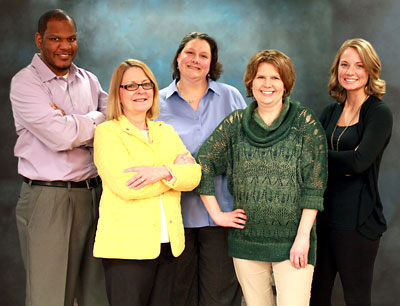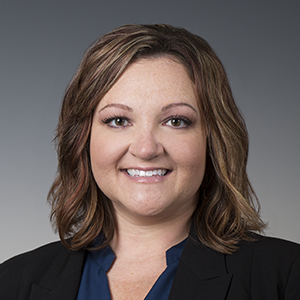The North Dakota Brain Injury Network
The NDBIN at the Center for Rural Health is designed to address the diverse needs of individuals with traumatic brain injuries.
By Nikki Massmann on

The North Dakota Brain Injury Network wants you to know that brain injuries don't just happen to professional football players. National news headlines have recently brought mainstream attention to the effects of brain injuries on professional sports athletes, particularly in the National Football League. But people are dealing with the oftentimes debilitating aftermath of brain injuries here in North Dakota, from multiple concussions to severe traumatic brain injuries.
Traumatic brain injuries (TBI) can present a complicated set of health issues that last long after the initial cause of the injury. Changes to thinking, behavior, and emotions are often not readily apparent or don't present themselves until later. As a result, individuals who have suffered a brain injury (and their families) find themselves attempting to navigate a labyrinth of health and human services ranging from support groups to rehabilitation. The system through which these services are provided isn't simple, and individual support isn't always offered from organizations that are collaborating on care. Further complicating matters is the fact that each individual's needs are unique; a child with a fall and resulting seizures has very different needs than a 35-year-old car crash survivor who needs a nursing home level of care or a veteran with a concussion and consequential emotional outbursts.
...families can call...facilitators to receive assistance in locating services in their area that are specific to the individual's needs.
The North Dakota Brain Injury Network (NDBIN) was recently established at the Center for Rural Health through funding from the North Dakota Department of Human Services. The program is designed to address the diverse needs of individuals with traumatic brain injuries by providing one-on-one resource navigation services through designated resource facilitators. These facilitators are located throughout North Dakota: one in Grand Forks, one in Towner, and one in Bismarck. Individuals with TBI issues and their families can call these facilitators to receive assistance in locating services in their area that are specific to the individual's needs. Thee program's director, Rebecca Quinn, has been working with individuals with traumatic brain injuries since 2007. She draws on her background in social work to be able to assist these individuals, which sometimes includes advocating on their behalf. Her day doesn't start at 8 a.m. and end at 5 p.m. A typical day could mean anything from simply listening to a family member's concerns to running an evening support group to driving across the state to educate the public on brain injury prevention. Her experience is the basis of the North Dakota Brain Injury Network, the foundation on which the program is being built.
The NDBIN is a natural extension of the Center for Rural Health's commitment to improving the health status and lives of rural North Dakotans. The Center is dedicated to building local organizational capacity and the NDBIN offers not only the opportunity to build educational and information pathways and to further the linkage with rural and urban health professionals but it also engages individuals and families in a more direct and personal manner.
In addition to helping individuals with TBIs, there is a great need in assisting providers so that they may best meet the needs of their patients. The NDBIN is working toward bridging gaps in information for providers by offering education on available services and ensuring their resource facilitation expertise is well-publicized in hospitals and clinics that see patients with TBIs. The program has developed a referral process for providers, social workers, and partner organizations to provide to their clients or patients. The process is simple: the patient or their family member fills out a few questions on a form and submits it to the North Dakota Brain Injury Network. The submission of the form prompts a resource facilitator to follow up with the client and gives them permission to initiate a consultation for the individual. This referral process creates a single point of contact for locating services and supports that are tailored to the individual's needs.
An important aspect of living with the effects of a brain injury is peer-to-peer support. Family members and TBI patients alike can sometimes feel like they are alone in their situation, or aren't aware of others going through some of the same struggles. The effects of brain injuries can still carry a stigma similar to that which surrounds mental health issues. Patients sometimes try to hide their symptoms or feel ashamed that they don't have more control over their behavior. Adult TBI patients can have difficulty returning to work, and children who have suffered a TBI can have problems in school that didn't exist before their injury. Relationships for all TBI patients can be strained because of the changes that have occurred as a result of their injury. The everyday struggles of a TBI patient can include anything from headaches, difficulty concentrating, and depression to severe cognitive or physical impairment. The NDBIN works to assist those individuals by connecting them with peers, ideally within their own communities, so that they have someone to talk to who is experiencing a similar situation.
A conversation about brain injury cannot take place without mentioning prevention. The NDBIN also provides presentations and information on how brain injuries can be prevented in the first place, from wearing a helmet during sports activities to implementing policies in schools for concussion treatment before a student can return to activities. The national headlines regarding the long-term effects of multiple concussions have shed a much needed light on these issues that Quinn says have been around for quite some time. "Traumatic brain injuries and health costs associated with them aren't new," she said. "But general public awareness of the lingering effects of a brain injury is something that is more recent. The attention has helped to improve our ability to increase the public's understanding of what a TBI patient deals with day to day."
Brain injuries can affect anyone at any time. No group understands this better than the North Dakota Brain Injury Network. Their expertise and the assistance they are providing are available to all individuals who have suffered a TBI and their families. The NDBIN is helping to navigate the path for their clients and serving as a bright light in what is often a dark tunnel. The staff wants everyone to know they are not alone and have an ally in improving their lives through support from the North Dakota Brain Injury Network.
This article originally appeared in the Spring 2014 issue of North Dakota Medicine.


 is the Director of Communications at the Energy and Environmental Research Center (EERC). Prior to her position at the EERC, she served as Communication Coordinator at the Center for Rural Health at the University of North Dakota's School of Medicine & Health Sciences.
is the Director of Communications at the Energy and Environmental Research Center (EERC). Prior to her position at the EERC, she served as Communication Coordinator at the Center for Rural Health at the University of North Dakota's School of Medicine & Health Sciences.



